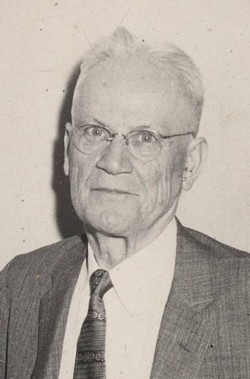J. Waskom Pickett
 Jarrell Waskom Pickett (1890-1981) J. Waskom Pickett was born near Jonesville, Texas, February 21, 1890, to L.L. Pickett (a Methodist minister) and his wife Ludie. After a brief move to South Carolina, the Pickett family moved permanently to Wilmore, Kentucky.
Jarrell Waskom Pickett (1890-1981) J. Waskom Pickett was born near Jonesville, Texas, February 21, 1890, to L.L. Pickett (a Methodist minister) and his wife Ludie. After a brief move to South Carolina, the Pickett family moved permanently to Wilmore, Kentucky.
Pickett attended Asbury College, graduating in 1907. After college, he taught Greek at Arkansas Holiness College in Villonia, Arkansas, and at Taylor University in Upland, Indiana. In 1910, well-known missionary and college classmate E. Stanley Jones contacted Pickett by cablegram and urged him to come to India to replace Jones as pastor of a Methodist church there. That connection would lead to 46 years of ministry in India, where Pickett served as a pastor, district superintendent, editor of the Indian Witness, and bishop of the Methodist Church in India.
During his time in India, J. Waskom Pickett found himself in circles of high influence. It has been said that no expatriate had more political influence in post-independence India. He was personal friends of Jawahirlal Nehru, the first Prime Minister of India, and Mahatma Gandhi. In fact, two days before Gandhi’s assassination, Pickett spent 45 minutes with Gandhi at Nehru’s urging, pleading unsuccessfully with him to leave Delhi. Indira Gandhi, India’s fourth Prime Minister, attended a Bible study in the Pickett home. Pickett met with U.S. Presidents Truman and Eisenhower to discuss political and humanitarian issues in India.
Donald Ebright, former Director of Famine Relief for the National Christian Council of India, wrote that during the riots following independence, Bishop Pickett “did more than any one non-government person to organize voluntary relief in Delhi.” Dr. Charles Perrill said that Pickett furthered Christian medical care in India more than any other individual. There is good evidence that H.C. Mookerjee, Vice President of the Constituent Assembly, consulted Pickett on the religious liberties clause of the Indian Constitution, the only constitution that specifically gives the right to propagate one’s faith.
Pickett wrote eight books, the most influential of which was Christian Mass Movements in India. This work was the most ambitious survey of its kind outside of the West. It laid the foundation for the ideas of church growth pioneer Donald McGavran, who called it the “missiological book of the century”. This groundbreaking survey, which legitimized the use of social science for research on evangelism, caused many mission boards and Indian churches to rethink and alter their priorities and methods.
Pickett retired from the mission field in 1956, and he and his wife Ruth (daughter of J.W. Robinson, another Methodist Bishop in India) moved back to the U.S. He spent three years as professor of world missions at Boston University School of Theology. J. Waskom Pickett died in Columbus, Ohio, on August 17, 1981. He is buried in Wilmore, Kentucky.
Materials by Dr. J. Waskom Pickett Available at the Kinlaw Library and/or Asbury College Archives:
- Christian Mass Movements in India: A Study with Recommendations (1933)
- Christian Movements in Mid-India (1938)
- Christ’s Way to India’s Heart (1938)
- Church Growth and Group Conversion (1956)
- Dynamics of Church Growth (1963)
- My Twentieth Century Odyssey (1980)
Bio Written by Matt Kinnell
References:
- Obituary text (unidentified source)
- Written testimony by J. Waskom Pickett
- “Gospel Ferment in India Among both Hindus and Christians: Bishop J. Waskom Pickett’s Rethinking on 1930s Missions in India”, by Art McPhee, published in the International Journal of Frontier Missions, Fall 2002
- “Deep Congregational Development Roots”, by John H. Southwick, published in Background Data for Mission, November 2005